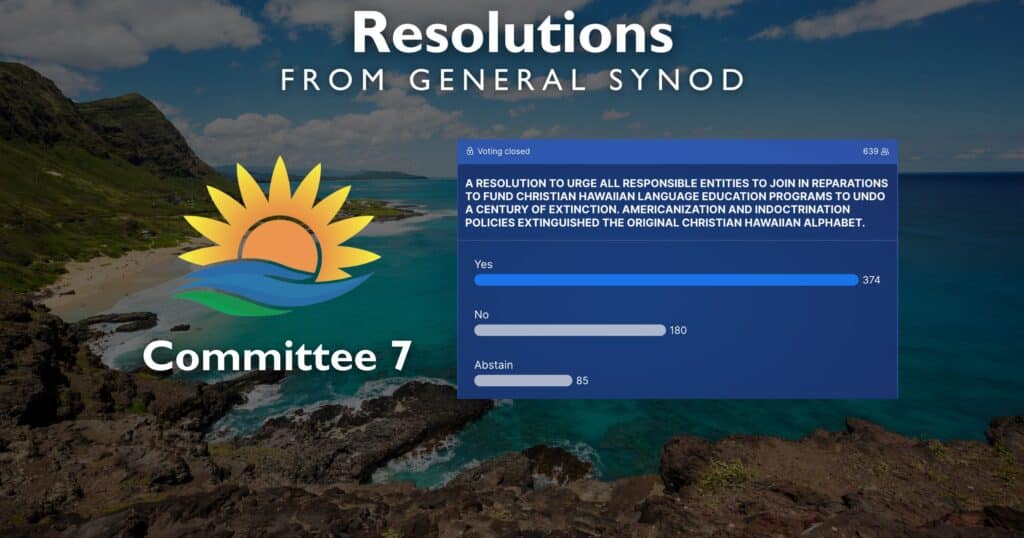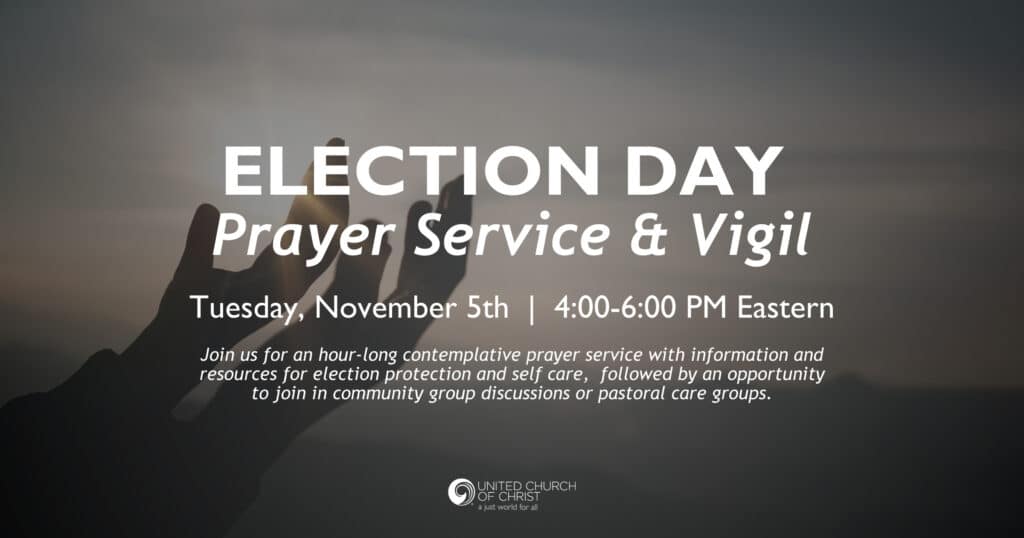In narrow vote, Synod supports reparation efforts for Hawaiian language revitalization
General Synod narrowly passed a resolution urging reparations to fund Christian Hawaiian education programs that will aim to “undo a century of extinction, Americanization and indoctrination policies.”
The resolution passed with 377 United Church of Christ delegates voting yes and 181 voting no. A notable amount — 85 — abstained from voting. It reached the two-thirds vote needed to pass with a five-vote margin.
The Rev. Gloria Cox of Pilgrim Congregational Church of Oak Park, Ill., chaired the resolution’s committee. She presented the resolution with historical context on the 21-letter alphabet that missionaries created as part of a Hawaiian Christian language that was used in early texts translated into the Hawaiian language — the version of the language that the resolution calls to revitalize.
“Language, written and spoken, is how we communicate, share and preserve our culture,” Cox said. “Extinguishing a language is one step on the slippery slope to extinguishing and losing the gifts of a culture — gifts that are lost to the Indigenous people and their descendants, and to all of us. But if the language and the culture can be revitalized, the possibilities are endless.”
Importance of language
Several comments from delegates supported language revitalization efforts, citing the importance that language plays within culture and describing impacts of colonization.
“I am a good example of forced assimilation by this country’s tactics and what they have done to me and my family,” said Larry Littlegeorge, representative of the Council for American Indian Ministry. “I came from the 1950s when we could not speak Ho-Chunk, our own language. Their motto was ‘Kill the Indian and save the man.’ When you lose your language, you lose identity as a person.”
Gloria-Ann Muraki, a member of the Association of Hawaiian Evangelical Churches (AHEC) — the Association that submitted the resolution — and of the UCC Board, shared that she is a native Hawaiian elder and traditional practitioner of her language, hula, chant (oli) and other traditional practices. She offered an oli in her native language.
“We as the Association of Hawaiian Evangelical Churches have been fighting an uphill battle to become self-governed for 31 years, since the formation of this association,” she said. “This [resolution] is part of that struggle.”
Decolonizing language
Some comments challenged nuances of the resolution’s proposal to support revitalization programs specifically for the 21-letter alphabet language that was brought by missionaries, which is different than the 13-letter alphabet letter which has been the focus of broad efforts to revitalize the Hawaiian language.
Wryen Keoki Kiwaha of Puka’ana Congregational Church in Captain Cook, Hawaii, requested, as a Native Hawaiian not part of AHEC, that the resolution be sent back to Hawaii “so all Hawaiians can be part of the conversation.”
“I affirm the elders and educators whose tireless work saved our language from extinction. Their work did not include these additional letters, perhaps because they’re not actually native,” he said. “I affirm non-Christian Hawaiians who may be affected by this Christian alphabet and who, like me, are offended as we see our language as Hawaiian only, not Christian. Why would we want language from the same missionaries who gave us boarding schools?”
The Rev. Tyler Connoley, Conference Minister of the Central Pacific Conference and UCC Board member, said that as a descendent of Pilgrim Holiness and Wesleyan missionaries, they have “a lifelong and particular call to decolonize church.”
“Rather than celebrating that the first book written in the Hawaiian language was the Bible with its 21 letters, we should be confessing that fact. Our missionaries came not to listen, but to tell,” they said. “I cannot celebrate that the native Hawaiians first saw their language written only as a Christian language.”
Despite the reservations voiced, the resolution passed — with minor edits put forth by the resolution’s committee for clarification — receiving the required two-thirds majority of delegate votes.
Content on ucc.org is copyrighted by the National Setting of the United Church of Christ and may be only shared according to the guidelines outlined here.
Related News
UCC to offer Election Day Prayer Service and Vigil
On Election Day, Nov. 5, join the Rev. Karen Georgia A. Thompson together with United Church...
Read MoreGoing beyond the blessing: Churches emulate St. Francis’ care for animals
https://www.youtube.com/watch?v=lu3LYwhLxCo UCC News presents a video news story on the...
Read MoreUCC leaders invite all to global celebration of Reformation Sunday
This Reformation Sunday, leaders from the United Church of Christ will participate in a global...
Read More


